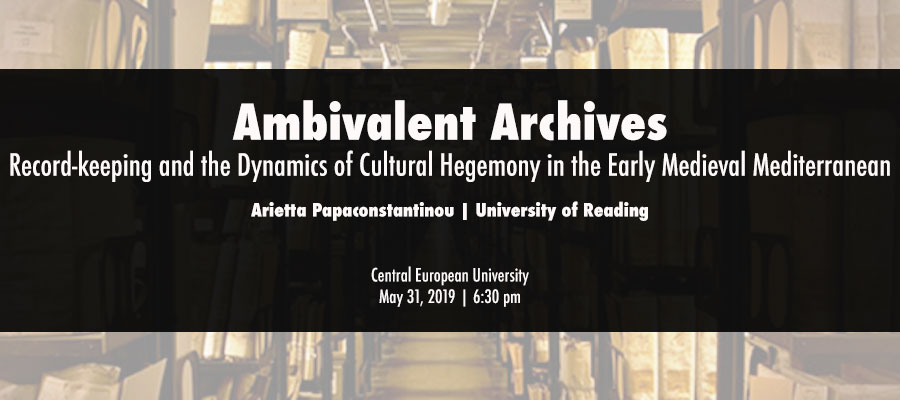Ambivalent Archives: Record-keeping and the Dynamics of Cultural Hegemony in the Early Medieval Mediterranean, lecture by Arietta Papaconstantinou (University of Reading), Center for Eastern Mediterranean Studies, Central European University, May 31, 2019, 6:30 pm
Writing and archives have a long history, and both are linked to power. They have been analysed as one of several ‘technologies of power’ put into practice by imperial polities to administer and control their territories, and organise the extraction of resources that was necessary to their survival and expansion. Already by the end of antiquity, they had become so standard in the eastern Mediterranean that they were taken as much for granted by the contemporaries as they are by scholars. Yet very few of those archives have been preserved for late antiquity and the early middle ages, and the distribution of those that have is very unequal: a considerable number from Egypt, some from Palestine and North Arabia, and some from North Africa and Spain. Of these, only about a third are official or institutional in nature. If we exclude monastic archives to concentrate on those produced by imperial structures and their repercussions down the line, we find that very few include material in any other language than the language (or languages) of power. Unsurprising as this may seem at first sight, the existence – and the content – of several official archives which do include material in the indigenous language, show that this must have been the norm rather than the exception.
In this lecture I shall briefly present those archives and discuss their implications. Their very existence presupposes a group of indigenous administrative specialists who could produce such documents, and in a position to negotiate the forms and the modality of imperial power at the local level. Their bilingualism and intermediate social position made of them cultural brokers who controlled the encounter between the indigenous population and the representatives of the imperial centre. By producing documents for an official archive in their own language, they created a linguistic barrier that made imperial officials dependent on them. At the same time, they were able to promote and help implement new policies, and effectively generated an administrative idiom in the indigenous language that mirrored, but also naturalised, that of the imperial culture.
Arietta Papaconstantinou is Associate Professor in Ancient History at the University of Reading. Her research bears on the history of the eastern Mediterranean in the late antique and early medieval period, and combines literature, history, and archaeology.
